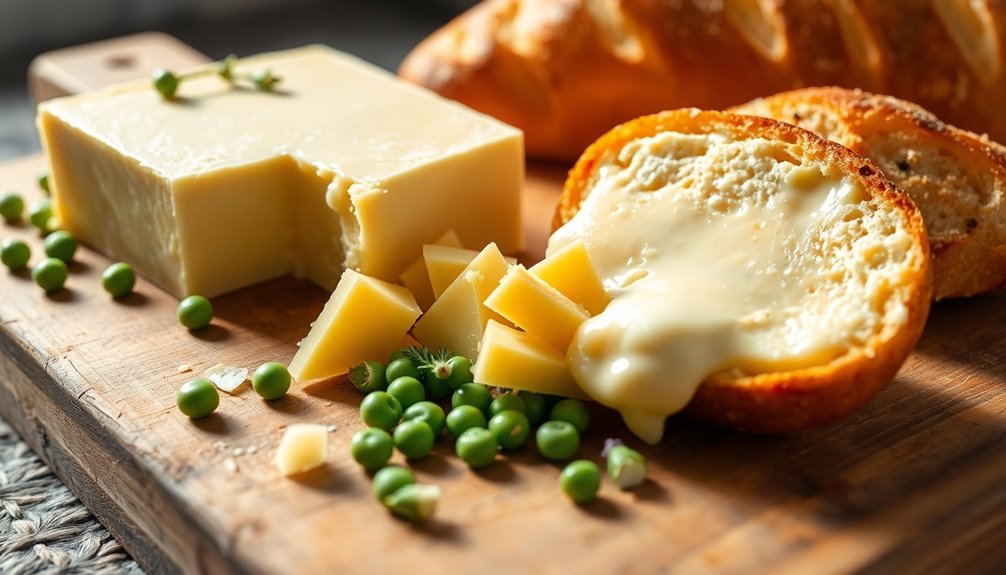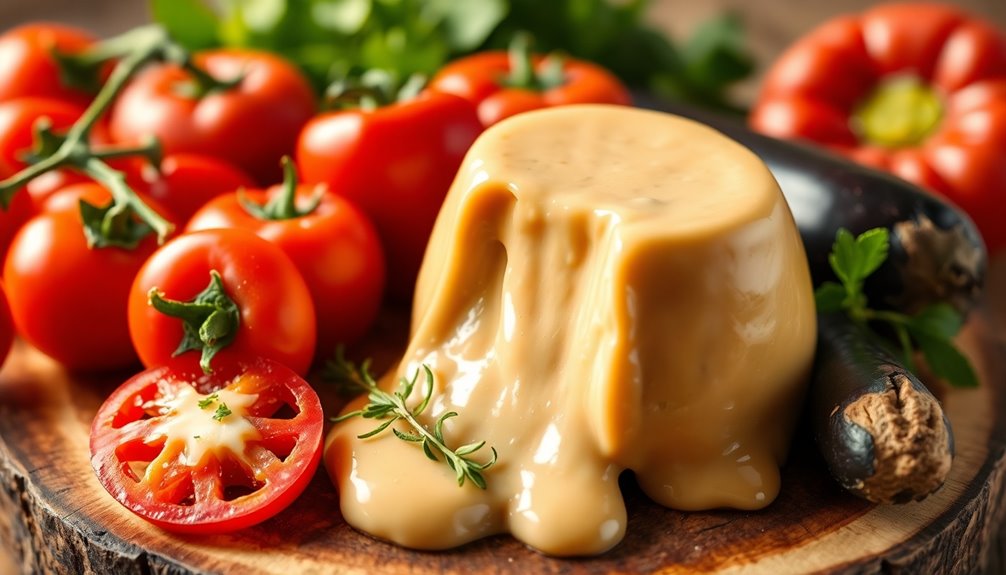Pea-based cooking cheese matches the taste and texture of traditional cheese beautifully, making it a great option for plant-based diets. With a protein-rich profile and a blend of oils that reduces saturated fat, it mimics the firmness and meltability you love. Flavor enhancers, like oregano and rosemary, mask the legume taste, ensuring a satisfying experience. If you're curious about how it all comes together, there's more to discover about this tasty alternative.
Key Takeaways
- Pea-based cooking cheese features a mild flavor that enhances versatility in various dishes, matching the appeal of classic cheeses.
- Researchers focus on texture development using coconut oil and specific starches to replicate the firmness and meltability of dairy cheese.
- Flavor enhancements, including spices like oregano and rosemary, effectively mask the legume taste, improving overall taste appeal.
- Nutritionally, pea-based cooking cheese offers higher protein and lower fat content compared to traditional cheeses, catering to health-conscious consumers.
- Hybrid cheese options blend dairy proteins with pea protein, providing a familiar taste and texture for those transitioning to plant-based alternatives.

As consumers increasingly seek plant-based alternatives, pea-based cooking cheese has emerged as a delicious and nutritious option. Made primarily from pea protein, this cheese alternative boasts a mild flavor that makes it versatile in a variety of dishes. Researchers are focused on enhancing its texture and nutrition to closely resemble traditional dairy cheeses, creating an appealing option for those looking to reduce their dairy intake.
One of the standout features of pea-based cheeses is their impressive nutritional profile. With around 134 g/kg of protein, they offer a significant boost compared to many dairy options. Additionally, these cheeses generally contain lower fat content, making them a healthier choice without sacrificing flavor. By incorporating pea protein, manufacturers can also increase dietary fiber, providing even more health benefits. Furthermore, the blend of sunflower and coconut oil helps reduce saturated fat content, making it easier for health-conscious consumers to enjoy cheese without the guilt.
Texture is crucial when it comes to cheese, and researchers are making strides in matching the firmness and meltability of dairy cheese. By experimenting with different fat matrices, like coconut oil, they've found that increasing the oil content enhances the texture, resulting in a firmer product.
When formulated thoughtfully with specific starches and texturizers, pea-based cheeses can achieve the desirable melt behavior that many consumers crave.
Flavor is another critical aspect of consumer acceptance. Adding spices like oregano and rosemary can effectively mask any legume taste, while fermentation techniques are being explored to improve aroma profiles.
Hybrid cheeses, which mix dairy proteins with pea protein, aim to deliver the familiar taste and texture of traditional cheeses, making them an enticing option for those hesitant to switch entirely to plant-based products.
Frequently Asked Questions
Is Pea-Based Cheese Suitable for People With Nut Allergies?
If you have nut allergies, pea-based cheese might be suitable for you, but it's essential to be cautious.
While most people with peanut allergies can tolerate peas, about 5% may still react to pea protein.
Since pea protein isn't classified as a major allergen, you mightn't find it labeled clearly in products.
Always check ingredients carefully and consult with a healthcare professional if you're unsure about trying pea-based cheese.
How Does Pea-Based Cheese Compare in Calories to Dairy Cheese?
Imagine biting into a light, fluffy cloud—this is how pea-based cheese feels in comparison to dairy cheese.
When you look at calories, you'll notice that pea-based cheese typically has fewer calories than its dairy counterpart, making it a lighter choice.
While dairy cheese can pack in more calories due to its fat content, pea cheese offers a satisfying alternative that's easier on your diet without sacrificing flavor or enjoyment.
Can Pea-Based Cheese Be Frozen for Later Use?
Yes, you can freeze pea-based cheese for later use.
Just be mindful of its moisture content, as higher levels can affect texture during freezing. To maintain quality, use airtight containers and opt for slow freezing methods.
When you're ready to use it, thaw it in the refrigerator to minimize texture changes. Keep in mind that you might need to re-emulsify or adjust the formulation after thawing for the best results.
Where Can I Buy Pea-Based Cooking Cheese?
Where there's a will, there's a way!
You can buy pea-based cooking cheese at various health food stores, specialty vegan shops, and online retailers.
Check popular e-commerce sites like Amazon or dedicated vegan grocery websites. Local supermarkets might also stock brands like Riyas Vegan Paneer in their dairy alternatives section.
Always take a moment to read the labels to ensure you're getting the right product for your needs!
Is Pea-Based Cheese Gluten-Free?
Yes, most pea-based cheese alternatives are gluten-free, making them a great option for those with gluten sensitivities.
When you're shopping, look for products specifically labeled as gluten-free to ensure they meet the necessary standards. Brands like Teese offer gluten-free options, and many manufacturers take care to avoid cross-contamination in their facilities.
Conclusion
Incorporating pea-based cooking cheese into your meals makes for a delightful dining experience. You'll savor the sensational taste and similar texture that rivals traditional cheese. Whether you're whipping up a warm pasta dish or a cheesy casserole, this plant-powered option proves to be a perfect pick. So, why not give it a go? Dive into deliciousness and discover how this innovative ingredient can transform your cooking, making every bite both nutritious and undeniably mouthwatering!









